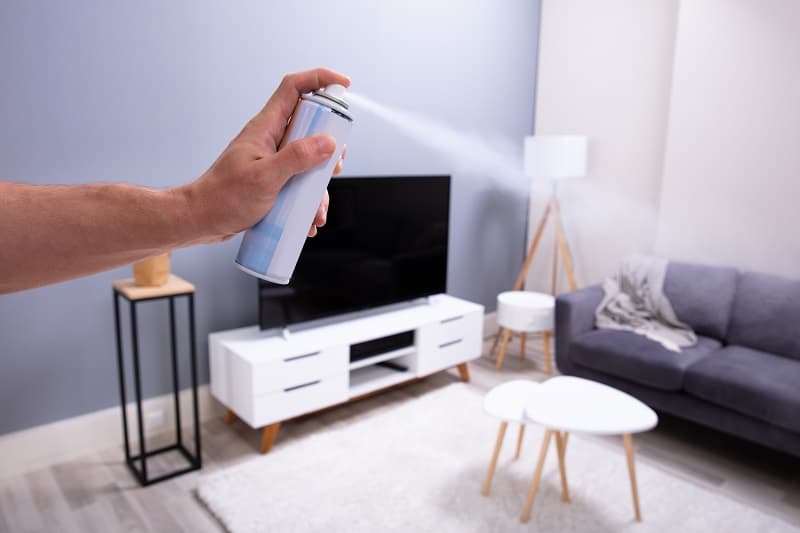If you are like me, you enjoy smelling a nice fragrance as you walk from room to room within your home. When bad smells linger in the air, air fresheners offer a quick solution to revive your space. But when we choose to cover up those nasty odors, are we compromising our safety? You may have read “keep away from flames” in fine print on the back of your canister, but have you ever wondered if air fresheners are truly flammable?
Aerosols contain chemicals. In some cases, air fresheners near a heat source have become pressurized and exploded causing severe burns to bystanders. Heat sources can include direct sunlight, open fire on a burning stove, and even lit cigarettes.
For safety, both the canister and its contents should be kept a significant distance away from heat to prevent air fresheners from becoming flammable.
Not all air fresheners are created equal. Follow along to learn more about safe ways to keep your home smelling fresh.

What Makes Air Fresheners Flammable?
Air fresheners are used to mask or eliminate odors. The pleasant aromas you smell after using your favorite air freshener is partially the result of a set of chemical compounds. Manual and automatic-release sprays are compressed gasses that linger in the air to remove odors. Some even have chemical compounds that disinfect the air, ridding it of mold and/or bacteria.
Whenever chemicals are involved, there is a possibility for a canister to burst into flames. A number of harmful chemical ingredients help make up the aromatic products we use. According to scientists, some of the chemical ingredients added to air freshener formulas are:
- Propane
- Butanol
- Ethanol
- Kerosene
- Isobutane
Many of these chemicals are considered to be volatile organic compounds – chemicals emitted as gasses that can have negative short or long-term effects on human life (and possibly your pets). You might assume that you can simply read product ingredients on the back of a can to avoid ones with any of these chemicals, but that is not always true. Some companies print less than ten percent of air freshener ingredients on product labels. Omission is legal.
Read more:
And even natural, or “green,” air fresheners can be potentially hazardous.
When you press down on a nozzle, the mist that sprays out is a combination of chemical propellant and fragrance that has been packed under pressure. This is the intended use of containers of air fresheners. But sometimes where the can is placed or where the mist is sprayed can create an unsafe situation.
Applying heat to chemicals under pressure is a bad combination. Depending on which chemicals have been used to create the product, aerosol air fresheners can be highly flammable. Spraying air freshener near an open fire, flames from a gas stove, or even near a lit cigarette, can cause an explosion.
In one instance, back in 2011, a mother of four had an automatic air freshener replacement canister sitting on a kitchen work surface that was a little over eight feet away from her stove. The can felt cool when she picked it up, but then it exploded in her hands. She was hospitalized for a full week to treat the resulting burns.
A man in England sprayed air freshener in his car and then proceeded to light a cigarette without any ventilation. This caused his car to explode. Luckily, he only experienced minor injuries, but it could have been worse for him.
So in addition to the chemical composition of air fresheners, adding heat to the mix in a poorly ventilated area, can lead to unsafe conditions for you and those around you.
Are Some Air Fresheners More Flammable than Others?
Since it is legal to only list about ten percent of ingredients on air freshener products, there is no way to know for sure if some air fresheners are more flammable than others.
Many of the more popular products, like AirWick, Glade, or Renuzit, caution consumers to avoid placing canisters near open flames, using them in poorly ventilated areas, or placing them in direct sunlight.
Febreze also suggests that you should avoid placing their cans in direct sunlight, but they claim that their fresheners are not flammable and are safe to use. This company has a list of 12 chemicals that are never added to their air freshener formulas. By using a natural nitrogen propellant, instead of butane, isobutane, or propane, Febreze claims that their aerosols never run the risk of causing an explosion.
How Can I Protect Myself from Flammable Air Fresheners?
The goal of air fresheners is to eliminate odors and freshen the air in your home, car, office, or other interior space. But if you want to avoid the flammability potential of air fresheners, you may want to consider alternative solutions to addressing odors within your space.
Here are some ideas to consider:
Understand the Product You are Using
Precautions can be taken to ensure that you are using the spray properly to avoid any harm to yourself or others. Read warnings on air freshener packaging to be aware of what precautions are best for that particular product. For instance, for its Automatic Air Freshener, Airwick instructs users: “Do not expose to heat or store at temperatures above 120 F (49 C). Do not position near heat or electrical sources. Do not spray into open flames.”
Review Ways to Respond to Emergencies
Understand emergency procedures. Sometimes safety guidelines are listed on a separate label. So be sure to read all of the fine print on your canister so that you will know how to react if there were to be an explosion.
Clean and Sanitize Regularly
Instead of covering up the odor, try eliminating it at the source. Did you cook fish the night before? Are those old gym clothes stinking up your closet? Has it been a while since you cleaned out the refrigerator? Regular, thorough cleaning and sanitizing can prevent bacterial growth, which minimizes odors.
Improve Indoor Air Quality
Proper ventilation, also called, healthy indoor air quality, can prevent you from having to spray air freshener as often. When there is proper air circulation, nasty odors do not stick around as long.
Use Natural Odor Eliminators
Sprinkling baking soda into your carpet fibers or on your upholstery, allowing it to sit, and then vacuuming the powder, can also help to eliminate odors in the home. Activated charcoal is another natural absorbent.
Explore Other Brands
Some companies are more transparent about ingredients used to create their air fresheners. Investigate different options for the air fresheners you purchase. If there are any toxic or flammable ingredients, consider purchasing from a more eco-conscious company.
Go Beyond the Aerosols
Using different forms of fragrances is also an option. Scented gels, waxes, and reed diffusers typically do not pose a dangerous threat. Essential oils, incense, reed diffusers, soy-based candles are some alternatives. Start learning more by reading my article on essential oil diffusers.
Simmer Some Fragrances
This is especially a treat during colder months. Create your own home fragrances by simmering spices and fresh fruit peels on your stovetop. This fragrance is like no others. It spreads through every room of your home.
Safety tip: Be certain to keep your water levels high so that the pot doesn’t burn.
Natural Air Filters
Decades ago, NASA conducted an experiment testing common indoor plants that naturally cleaned the air. In addition to absorbing carbon dioxide and releasing oxygen, these plants also absorb harmful toxins in the air, like benzene and formaldehyde. Some even combat strong odors like cigarette smoke, making your space cleaner and less likely to hold on to bad odors. Some of the plants mentioned were:
- Peace lily
- Golden pothos
- Heartleaf philodendron
- Red-edged dracaena
- Weeping fig
- Gerbera daisy
- Snake plant (mother-in-law’s tongue)
You can find a nice chart of the results, here.
Grow Your Own Fragrance
Fragrant houseplants are another option. Geraniums come in a variety of scents from spicy ginger or nutmeg to citrusy lemon or lime. These plants are easy to care for, too. Maybe consider fresh eucalyptus leaves, a pot of gardenias, fresh plumerias, or any of the sweet, fruity jasmine varietals. You may have to grow a green thumb, but maintaining fragrant houseplants is far healthier and less risky than spraying air fresheners.
In closing, air fresheners have the potential to be highly flammable, but there are lots of alternative solutions that you can use to create a fresh and clean atmosphere in your home.
